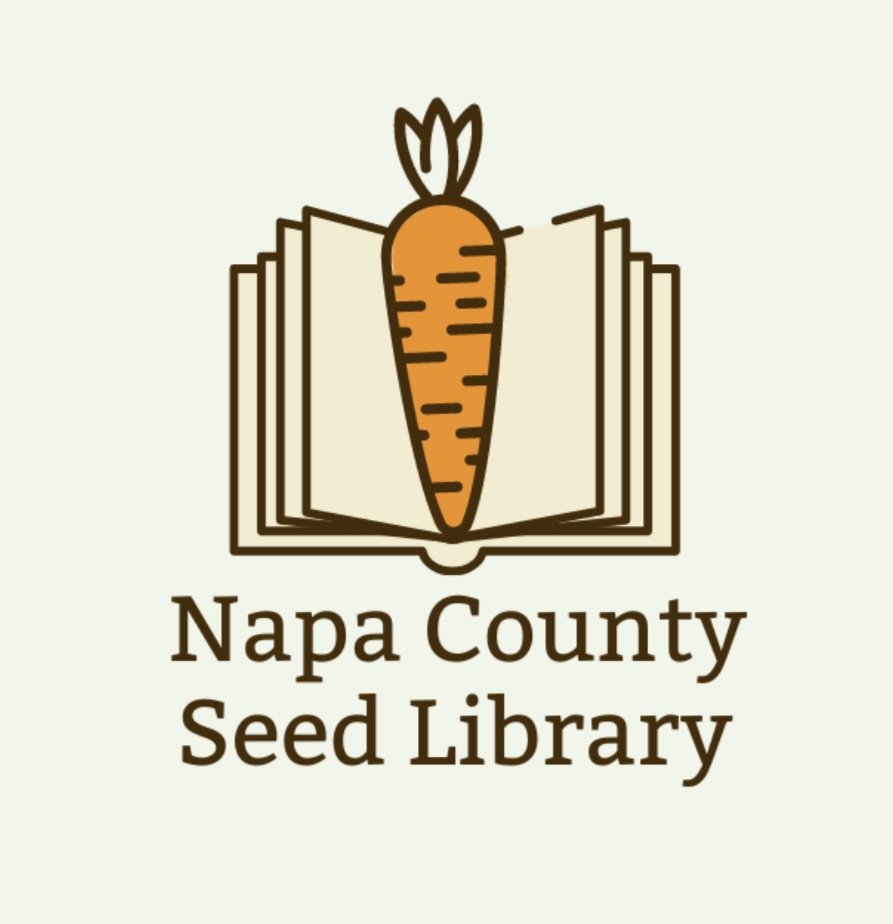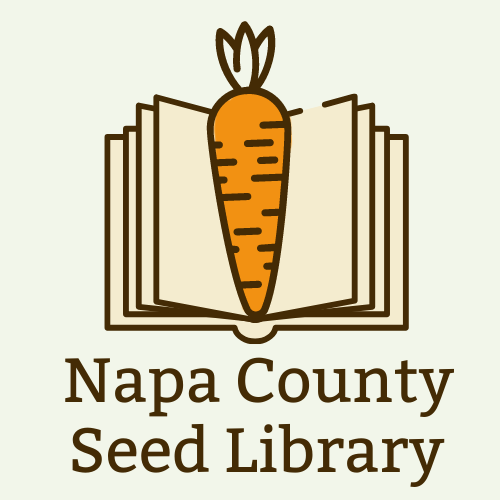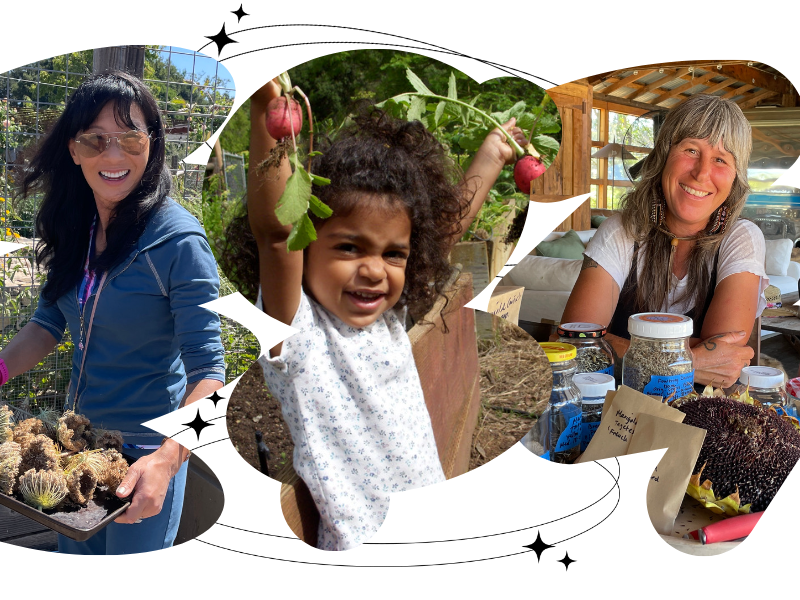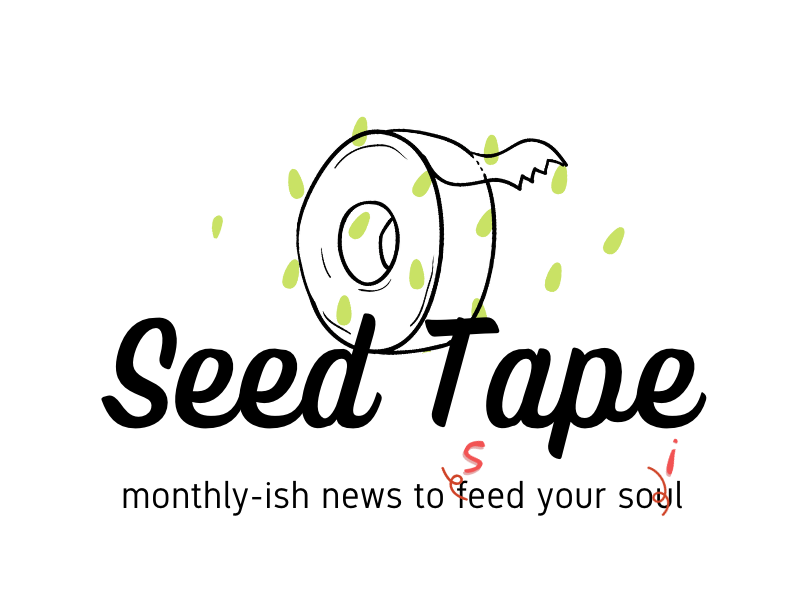
Seed library annex locations
The Napa County Seed Library operates as a network of seed library annexes established throughout Napa County. They are strategically placed where sharing seeds and knowledge about seedkeeping is active in the area where it is located. Each annex is unique and tended by one or more seed keepers. At these annexes you can borrow, grow, save, and return organic, locally adapted seeds. Watch this video to learn how to use them. To find the annex near you, scroll down this page to view their locations. We host an Annual Seed Swap and skill and knowledge shares to teach people how to grow from seeds. Go our Events page to find out where we’ll be in person next!
How Our Seed Libraries Sprout
-
We love that our seed libraries are well appreciated. We carefully consider expanding our network by only one annex per year because of the care and effort they need to thrive and serve each community well. In addition to the materials and cost to build and supply each annex, we require two or more seed keepers to attend to the annexes three times per week during the active gardening season.
Currently, we will consider adding annexes in South Napa, Rutherford, Yountville, and Calistoga. Please review our requirements for building and stewarding a seed library annex and then email us if you are interested. Thank you!
-
Napa Library Annex #8
Jeffrey Pine Annex #7
Annex #6
Permanently closed as of 5/22/25
Bird Nest Annex #5
St. Mary’s Episcopal Annex #4
St. Helena Library Annex #3
North Napa Annex #2
Downtown Annex #1
Community seed exchanges
In spring we host an Annual Seed Swap and in summer we host Tomatoganza! our seed saving festival heralding heirloom, open-pollinated tomatoes and the local farmers who grow them. To participate in our Seed Swap, be sure to bring mature, dry, and well-labeled organic seeds to exchange. Watch this video to learn how to prepare your seeds. We also occasionally host community seed exchanges, plus skill and knowledge shares at local events. View our Events page for scheduled dates.
About our seeds
Our mission is to grow, save and share locally adapted, organic seeds among people living in Napa County. We prioritize for open-pollinated and culturally significant seeds. We do not share genetically modified or chemically treated seeds. If you have questions, please contact us.
How do I use the libraries?
-
Each seed library annex is designed for you to borrow and donate seeds. Watch this video to see how easy it is to use the seed library annexes.
-
We only offer organically grown seeds that are mature, dry, clean, and freshly packed or harvested. If seeds donated are 4 years old or older, they may not germinate to grow into mature plants. Although seed can be viable for 5 to 15 years under ideal storage conditions, seed germination is best when planted within 2 to 3 years after the seed is harvested, dried, packaged, and stored properly.
-
Seed inventories and selections vary by annex location. To keep our supplies abundant, return or donate organically grown seeds that are either grown locally or by a trusted, ethical commercial seed company. We accept seed donations in commercial packets, coin envelopes, glass jars, or heavyweight paper bags. No plastic, please. We ask that seed donors follow the instructions in this video before donating or returning seed.
Which kinds of seeds
do you have?
-
We exchange vegetable, herb, flower, medicinal, ornamental seeds–and sometimes tree seeds–in harmony with the seasons that they do best to germinate in Napa County (USDA growing Zone 9b). We harvest and store seeds according to seasonal planting cycles and obtain seeds in Fall, according to the commercial seed cycle. Visit our Plant Seeds page to find what’s ready to plant each month in our growing zone. Then find the seed library annex nearest you to select what you are interested in growing. For growing tips, visit our How to Grow page.
-
From February through April you’ll find radish, lettuce, carrot, beets, pepper, tomatoes, cucumber, spinach, arugula, cilantro, chives, and flowers and ornamentals that attract pollinators.
-
From May through August you’ll find summer squashes (thin-skinned types like zucchini and patty pan), winter squash (thick-skinned types like acorn and butternut), eggplant, okra, tomatoes, corn, beans, basil, tomatillos, melons, and drought-tolerant flowers and ornamentals.
-
From September through January you’ll find beets, broccoli, Brussels sprouts, cabbage, cauliflower, kale, mustard greens, celery, pak choi, California native wildflowers, herbs, and cover crop.
How do you retain
seed quality?
-
Seed intake, handling, labeling, and storage are all essential to preserve the viability of our seed inventories. We ask that seed donors follow instructions in this video before donating seed. We store seeds in cool and dark spaces on indoor shelving and in chest freezers and refrigerators as temperatures fluctuate during the year. We strive to maintain temperature and humidity values (when added together) under 100.
-
The majority of our seeds come from commercial seed sources. A good portion also comes from locally grown seed sources. All seeds MUST be labeled for us to retain and share with others. Identify seed with (1) seed type, common name, and variety name; (2) harvest year (also labeled as a "packed for" year); (3) the name of the seed saver or seed company; and (4) the location the seed was grown and harvested. We prioritize exchanging open-pollinated, heritage seeds and sharing their culturally important stories.
-
Seed libraries are legally exempt from testing for seed germination. Find out why this preserves our mission to exchange seeds freely and serve a common good. We trust the labeling on seed from the commercial market and handle and store all seed to preserve highest quality. Independent of the seed type, we do not share seed older than 7 years past its harvest or packed for date.
-
Seeds are alive and people using the seed library annexes have varying degrees of seed saving skills. Occasionally we test for good seed germination, when in doubt and have time, but generally we trust that those who donate seeds to us are sharing seeds that are viable, not hybrids, untreated, and organic (not genetically modified). Independent of the seed type, we do not share seed older than 7 years past its harvest or packed for date.
Do you accept
hybrid seeds?
-
Open-pollination describes the way plants reproduce when unaided by human interventions such as pollinating by hand, introducing pollinators into a crop field, or hybridizing using genetic material in a laboratory. Locally adapted seed comes from plants that have been consistently grown in a region long enough (3 years or more) so that they form strong relationships with the region's soil, climate, and native pollinators. To learn more about the differences, read this blog post by Seed Savers Exchange.
-
Locally adapted seed grow to maturity and produce the next generation of plant genetic material (seeds). Locally adapted seed is typically healthier seed because it "knows" (has encoded in its genetics) the climate conditions (both stressors and benefits) of the region where it has grown for many years. This connection between seed, land, soil, and climate is what drives the evolution of good seed stock.
-
Heritage seeds are open-pollinated seeds with an interesting legacy and cultural story. (You might know them as heirloom seeds.) Because we want our seed inventories to include unique varieties that reflect the culture and people of Napa County, we prioritize for heritage seeds that carry important cultural stories.
-
But hybrid seeds aren’t for seed saving. This is simply because their method of reproduction comes from two different species or varieties that are crossed using human intervention, usually in a lab or under controlled conditions.















